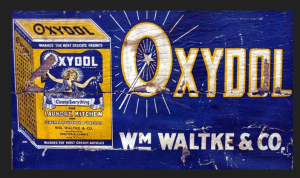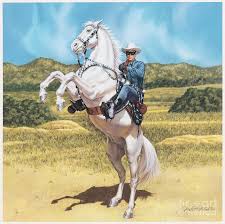September 3, 2020 (Thursday)
Most of my quarantine time has been spent with the computer and the writing of blogs. But lately I’ve been watching more T.V., mainly Netflix’s show, Heartland. It had 13 seasons of 18 episodes each, and I am into Season 10 right now. It’s not a religious show, but it’s family entertainment about the kinds of problems families can have. If rated, it no doubt would be PG. It is centered in a Canadian ranch and it’s about training horses and healing them. But it’s also about the people doing that. As I read reviews of the show, someone called it a soap opera, which I suppose is a title it has earned for itself.
When I saw the description, soap opera, immediately my mind went back to those days when I was a pre-schooler in the early 1930s and often living with grandparents. My grandmother truly loved all those old radio soap operas. They were usually 15 minutes long each day and could be heard in late morning and afternoon. Some of the titles of her programs that I can recall today were Ma Perkins, My True Story, One Man’s Family, Pepper Young’s Family, Lorenzo Jones, and The Guiding Light.Each program had a theme song and I remember Clair de Lune being played each afternoon. The programs had sponsors, almost always some type of soap, so they soon were labeled, soap operas. My grandmother never referred to them that way; she always talked about her stories.* She bought their products, too.

Late in the afternoon, I heard the kids’ shows, like The Lone Ranger, Jack Armstrong, the All American Boy, Captain Midnight, and many others. The theme for The Lone Ranger was the William Tell Overture, which I knew simply as The Lone Ranger Song.  The show was announced every day with the same introduction: “Hi-Yo, Silver! A fiery horse with the speed of light, a cloud of dust and a hearty ‘Hi-Yo Silver’… The Lone Ranger! With his faithful Indian companion, Tonto, the daring and resourceful masked rider of the plains led the fight for law and order in the early Western United States. Nowhere in the pages of history can one find a greater champion of justice. Return with us now to those thrilling days of yesteryear. From out of the past come the thundering hoof-beats of the great horse Silver. The Lone Ranger rides again!”
The show was announced every day with the same introduction: “Hi-Yo, Silver! A fiery horse with the speed of light, a cloud of dust and a hearty ‘Hi-Yo Silver’… The Lone Ranger! With his faithful Indian companion, Tonto, the daring and resourceful masked rider of the plains led the fight for law and order in the early Western United States. Nowhere in the pages of history can one find a greater champion of justice. Return with us now to those thrilling days of yesteryear. From out of the past come the thundering hoof-beats of the great horse Silver. The Lone Ranger rides again!”
The evening hours were usually filled with shows that ran 30 minutes or an hour, and families would gather in their living rooms to hear them. One that our family heard each week was Mister District Attorney. I can still hear his introduction in a sort of echo chamber: “And it shall be my duty, not only to prosecute to the limit of the law all persons accused of crimes perpetrated within this county, but to defend with equal vigor the rights and privileges of all its citizens,” which I memorized and remember to this day even though I was not sure what those words meant at that time. I was 8 or 9 years old. The year was 1940.
One of the nation’s favorite prime time shows was Lux Presents Hollywood, hosted by Cecil B. DeMille, in which a movie was translated into a radio script with actors and sound effects, reducing a 100-minute movie to about 45 minutes plus about 15 minutes of commercial breaks.
We loved the variety shows, the music programs, the dramas, the comedians like Bob Hope, Fred Allen and Jack Benny. We chuckled as George Burns played straight man to Gracie Allen’s cute character.We looked forward each week to Fibber McGee’s closet crashing and his comment, ‘Got to clean out that closet one of these days.” When the radio show became a tv show, the same actors played the same parts on video:
Gradually, radio became a primary source of news and music. The number of radio stations increased greatly. They did not remotely resemble the old-time radio shows.
A little trivia. All radios at first were “a.m.” radios, no “f.m.” yet, and our particular radio picked up the police radios at the very lowest part of the “a.m. dial.” From those day until now, we have watched communications technology grow into an entirely new science. But we need to remember that today’s miracles have been attained a step at a time and we would not have such things as “smart phones” were it not for the early days of telegraph and radio.
* Here’s Wikipedia’s list of radio soap operas. Older readers may remember some of them.
